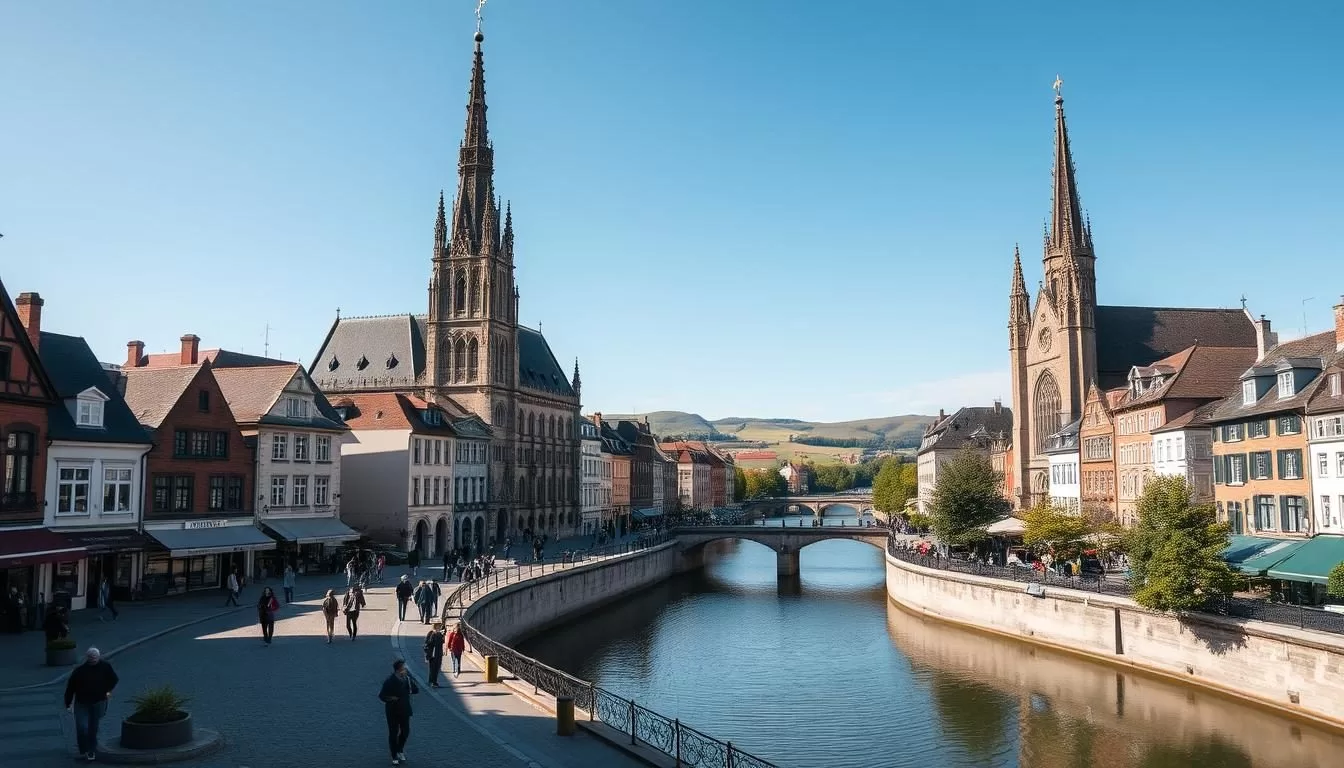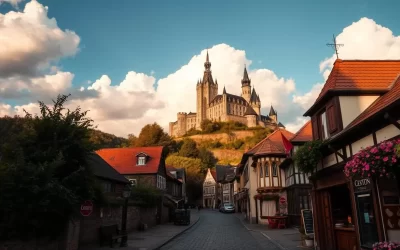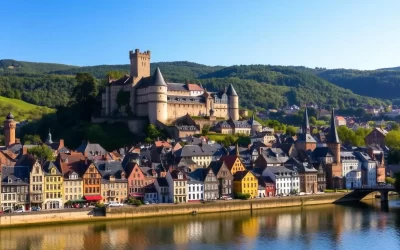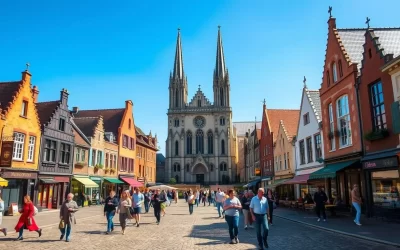Discover the charm of Leuven, a medieval city in Belgium that offers a unique blend of history and youthful energy. This compact town is perfect for a day trip from Brussels, allowing you to explore its top attractions without feeling rushed.
With its rich history and cultural heritage, Leuven boasts an impressive array of architectural marvels, world-class museums, and vibrant social scenes. As a university town with 55,000 students, it offers a dynamic environment that combines academic tradition with contemporary creativity.
Whether you’re interested in exploring historic squares, enjoying Belgian beer culture, or discovering hidden gems, Leuven has something special to offer every type of traveler. Get ready to experience the best of this medieval city.
Discovering Leuven: Belgium’s Hidden Gem
Tucked away in the heart of Belgium, Leuven is a treasure waiting to be discovered. As you plan your trip to Belgium, you might find yourself drawn to the well-known cities like Brussels or Bruges. However, Leuven stands out as one of Belgium’s most underrated destinations, offering a perfect blend of historical significance and modern vibrancy that makes it a must-visit location on any Belgian itinerary.
Leuven is conveniently located just 30 kilometers from Brussels, making it an ideal day trip or a longer stay destination. With excellent rail connections, you can easily reach Leuven from Brussels in around 20 minutes by train. This strategic location allows you to incorporate Leuven into your Belgium travel plans seamlessly.
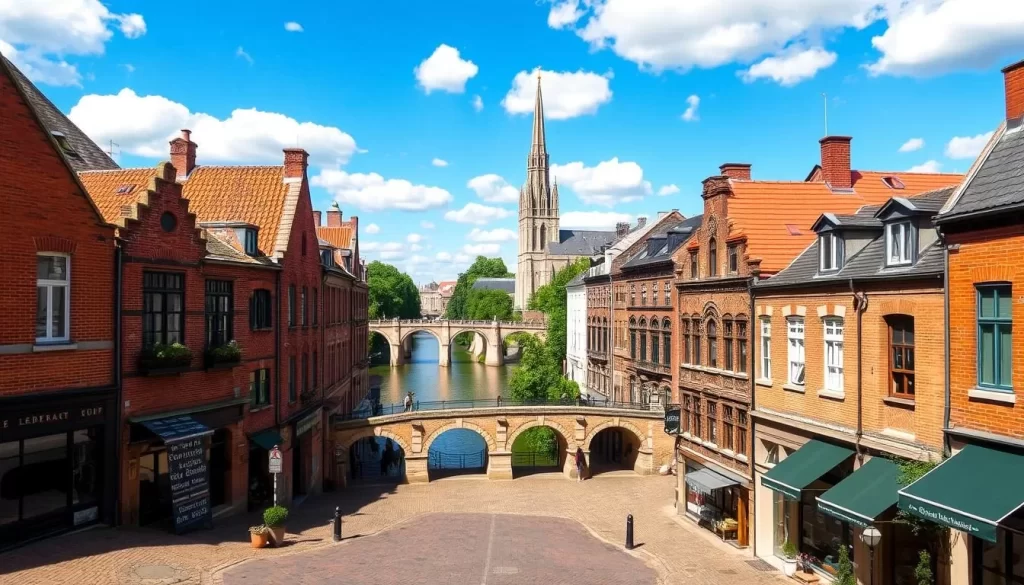
Why Leuven Should Be on Your Belgium Itinerary
As a university town with a history dating back centuries, Leuven provides visitors with a unique atmosphere where academic tradition meets youthful energy, creating a dynamic environment unlike anywhere else in Belgium. The presence of KU Leuven, one of Europe’s oldest universities founded in 1425, has shaped the city into an intellectual hub where innovation and tradition coexist, influencing everything from its cultural offerings to its renowned beer culture.
Unlike the tourist-packed streets of Bruges or Brussels, Leuven offers a more authentic experience where you can explore magnificent Gothic architecture, world-class museums, and charming cobblestone streets at a leisurely pace. The people of Leuven are known for their warm hospitality and multilingual abilities, making it easy for international visitors to navigate and connect with local culture during their trip.
- Experience the blend of historical significance and modern vibrancy.
- Explore the city’s magnificent Gothic architecture and world-class museums.
- Enjoy the lively atmosphere influenced by the university’s presence.
Brief History of Leuven
Throughout its rich history, Leuven has survived religious wars, revolutions, and two World Wars, with each era leaving its mark on the city’s architecture, culture, and identity. The city’s history is a testament to its resilience and adaptability, making it a fascinating place to explore. As you walk through Leuven, you’ll discover layers of history that have shaped the city into what it is today.
Leuven’s surroundings offer beautiful countryside and historic sites that complement the urban experience, providing options for those who wish to venture beyond the city center. Whether you’re interested in history, culture, or simply enjoying the local cuisine and beer, Leuven has something to offer.
How to Get to Leuven
Leuven is easily accessible by train, making it a perfect day trip destination from Brussels. The city’s strategic location in Belgium allows for convenient travel from various parts of the country.
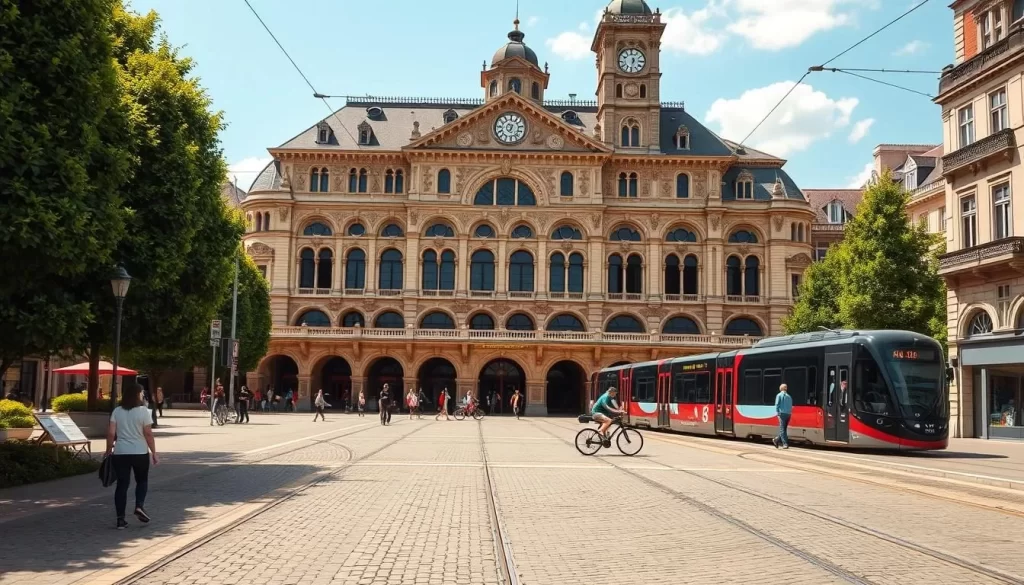
From Brussels to Leuven
The best way to travel to Leuven from Brussels is by train. There are direct services available from Brussels’ three main stations: Brussels-North, Brussels-Central, and Brussels-South (Midi). The journey takes approximately 20 to 30 minutes, depending on the departure station. Trains run frequently throughout the day, offering flexibility for visitors’ schedules.
For those planning a trip to Leuven, this connectivity makes it an ideal place to visit, whether you’re staying for a day or longer. You can easily plan your day according to the train schedule, making the most of your time in this beautiful city.
| Departure Station | Approximate Travel Time | Frequency |
|---|---|---|
| Brussels-North | 20-25 minutes | Frequent |
| Brussels-Central | 20-25 minutes | Frequent |
| Brussels-South (Midi) | 25-30 minutes | Frequent |
From Brussels Airport to Leuven
For international travelers, there’s good news: Brussels Airport offers direct train connections to Leuven. This service makes Leuven a convenient first stop upon arriving in Belgium, taking only about 15 minutes. The direct train from the airport to Leuven is a significant advantage, making your trip planning easier.
Getting Around Leuven
Once you arrive at Leuven’s train station, you’re just a short walking distance away from the city center. The journey along Martelarenlaan and Bondgenotenlaan takes about 10 to 15 minutes, leading you directly to the historic Grote Markt. For those who prefer not to walk, Leuven offers an efficient bus system. You can download the De Lijn app to purchase a ticket and plan your route within the city.
Leuven’s compact size makes it ideal for exploration on foot, with most major attractions located within walking distance of each other in the historic center. Consider purchasing a day pass if you plan to use public transportation frequently, as it offers better value than individual tickets.
When to Visit Leuven
The best time to visit Leuven depends on your preferences, as the city has distinct seasonal highlights. Leuven is a university town with a lively atmosphere, influenced by its 55,000 students. The city’s character changes throughout the year, offering various experiences for visitors.
Leuven experiences distinct seasonal changes, creating unique atmospheres throughout the year. In the summer, the city enjoys warm weather and vibrant outdoor life, making it an ideal time to explore. In contrast, winter brings a cozy atmosphere with Christmas markets and fewer tourists.
Seasonal Highlights in Leuven
Each season in Leuven offers a different experience. Summer (June-August) brings warm weather and long daylight hours, perfect for exploring the city’s many attractions. The cafe terraces spilling onto squares add to the vibrant atmosphere, though this is also peak tourist season.
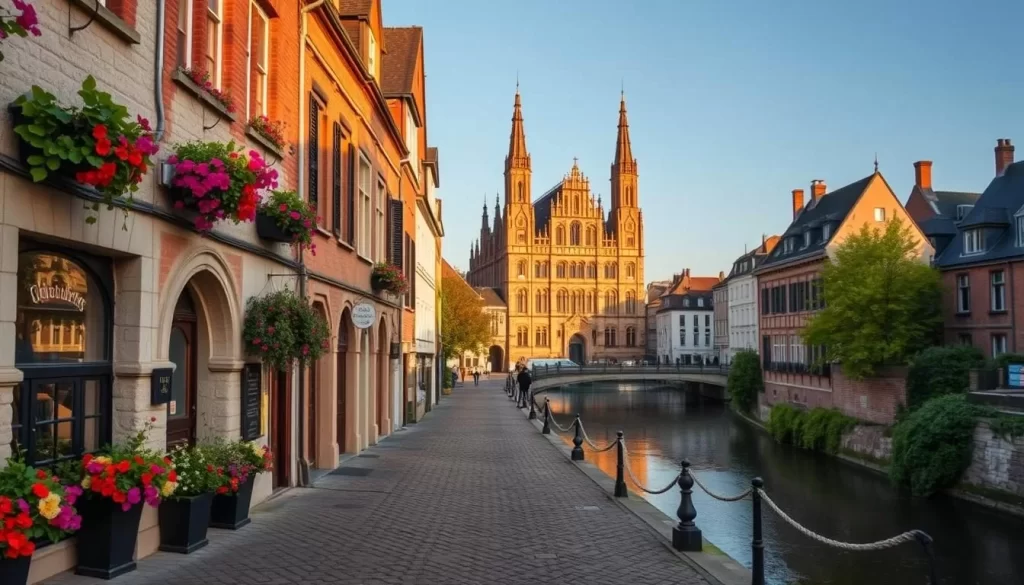
In Fall (September-November), the return of students injects fresh energy into the city as academic life resumes. The surrounding countryside displays beautiful autumn colors, making it a great time for outdoor activities.
Winter (December-February) transforms Leuven with charming Christmas markets and festive decorations, creating a cozy atmosphere. With fewer tourists, it’s an ideal time for those seeking a more authentic experience.
Spring (March-May) offers mild weather and blooming gardens, particularly at the Botanical Garden, making it one of the most pleasant times to visit for outdoor activities and photography.
| Season | Highlights | Activities |
|---|---|---|
| Summer | Warm weather, outdoor life | Exploring city attractions, cafe terraces |
| Fall | Autumn colors, student energy | Outdoor activities, experiencing university culture |
| Winter | Christmas markets, cozy atmosphere | Visiting Christmas markets, enjoying local cuisine |
| Spring | Mild weather, blooming gardens | Outdoor activities, photography at Botanical Garden |
Leuven’s Major Festivals and Events
Leuven’s festival calendar is filled with major events that attract people from across Belgium and beyond. The summer music festival Marktrock and the Leuven Beer Weekends in April are highlights, showcasing the city’s vibrant cultural scene and renowned brewing heritage.
During the academic year (September-June), student-led events and activities peak, giving visitors opportunities to experience the unique university culture that defines much of Leuven’s social life. Consider planning your day trip around one of Leuven’s specialized beer festivals to experience firsthand the city’s innovative approach to beer production developed at KU Leuven.
Grote Markt: The Heart of Leuven
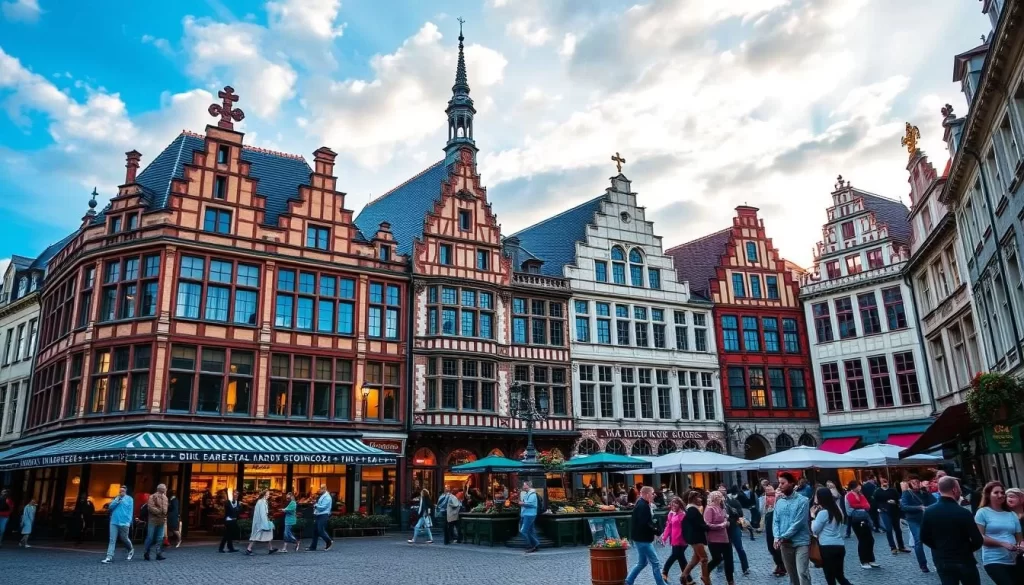
The Grote Markt is more than just a square; it’s the vibrant heart of Leuven. This historic square is the central gathering place of the city, surrounded by stunning architectural landmarks. As you explore the Grote Markt, you’ll be immersed in the rich history and culture of Leuven.
Leuven’s Stunning Town Hall
The Town Hall, or Stadhuis, is a masterpiece of 15th-century Gothic architecture. Its intricate stonework, adorned with over 230 statues, is a testament to the craftsmanship of the era. The building’s façade is a must-see attraction in Leuven, offering a glimpse into the city’s rich history.
The statues on the Town Hall depict a range of figures, from biblical characters to local nobles and scholars. Each statue tells a story, adding to the building’s cultural significance. As you admire the Town Hall, take note of the contrast between its ornate Gothic style and the more austere St. Peter’s Church opposite.
Saturday Morning Market Experience
On Saturday mornings, the area around the Grote Markt transforms into a bustling market. Local farmers and antique dealers set up stalls, offering a range of specialty products. You can sample artisanal cheeses, dried meats, and fresh mushrooms, or browse the unique antiques on display.
The Saturday market is a great place to experience local culture and pick up some unique souvenirs. As you browse the stalls, take in the lively atmosphere and enjoy the opportunity to interact with the friendly locals.
The Grote Markt is not just a historic square; it’s a hub of activity that reflects the city’s cultural rhythm. Throughout the year, the square hosts various events and festivals, from summer concerts to winter Christmas markets. Whether you’re looking to experience the local culture, admire historic architecture, or simply enjoy a Belgian beer, the Grote Markt is the perfect place to start your journey through Leuven.
St. Peter’s Church and Its Artistic Treasures
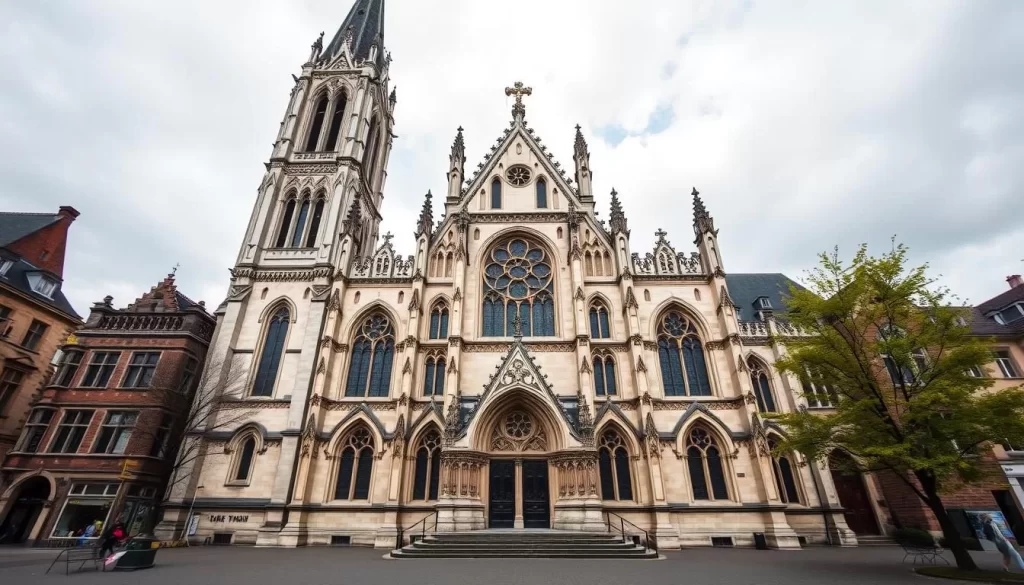
Leuven’s St. Peter’s Church stands as a testament to the city’s rich history and cultural heritage. This magnificent church, located in the heart of Leuven’s historical quarter, is a must-visit destination for anyone interested in art, history, or architecture.
The Last Supper by Dieric Bouts
One of the main attractions within St. Peter’s Church is “The Last Supper” by Dieric Bouts, a masterpiece of Flemish Primitive painting. Created in the 15th century, this painting is not only a significant religious artwork but also a rarity in having remained in its original location since its creation.
The innovative use of perspective and emotional depth in “The Last Supper” was revolutionary for its time, influencing generations of artists. As you stand before this masterpiece, you can appreciate the skill and artistry that went into its creation.
Gothic Architecture and Religious Heritage
St. Peter’s Church itself is a classic example of Brabantine Gothic architecture, with its soaring ceilings and magnificent stained glass windows. The church’s history dates back to the 10th century, though the current structure was largely completed in 1497.
The church houses an impressive collection of Flemish art, including carved wooden altarpieces, religious sculptures, and paintings. Visiting the church in the early morning or late afternoon allows you to see these artworks in the best light, as natural light filters through the windows, highlighting their details.
Throughout its history, St. Peter’s Church has faced numerous challenges, including partial destruction during World War II. However, subsequent restoration efforts have preserved this important piece of Leuven’s religious and cultural heritage for future generations.
The church’s exterior is equally impressive, featuring an unfinished tower that was originally planned to be the tallest in the world at 170 meters. Although it was abandoned due to unstable ground, the tower’s unique silhouette has become emblematic of Leuven’s skyline.
University Library and Bell Tower
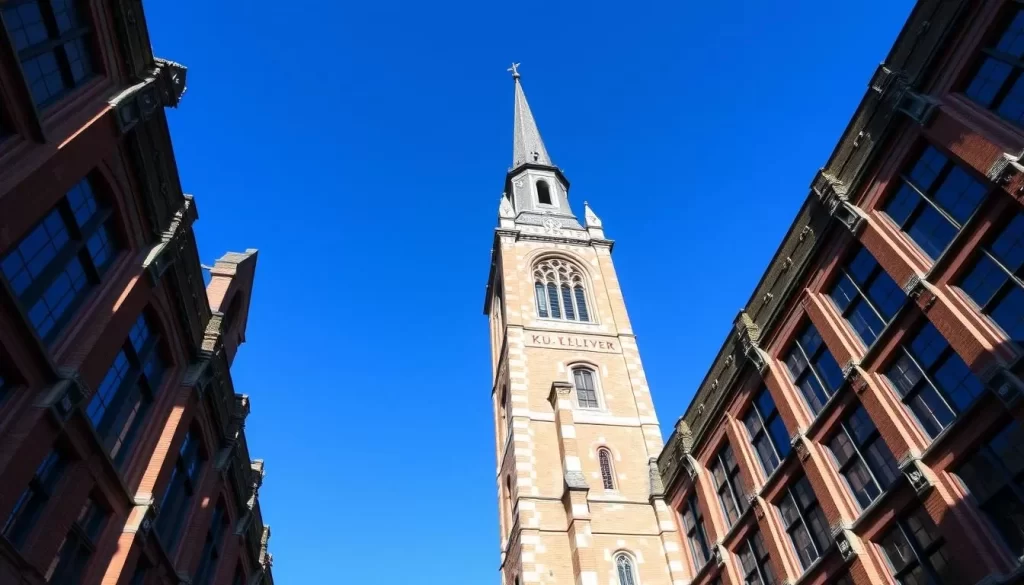
One of Leuven’s most iconic landmarks, the University Library, is a place where history, education, and scenic views converge. As a cornerstone of KU Leuven, it symbolizes both academic excellence and the city’s resilience.
Rebuilding a Legacy: History and Reconstruction
The University Library has a rich and tumultuous history, having been destroyed twice during the World Wars. The original library was burned to the ground by German soldiers on August 25, 1914, resulting in the loss of 230,000 books and 750 medieval manuscripts. This act of cultural destruction shocked the academic world. After World War I, the library was rebuilt with the help of donations from 400 American universities. The reconstruction was designed by Whitney Warren, who also designed New York’s Grand Central Station. The library tower was intentionally designed with symbolic elements, including a statue of the Virgin Mary defeating the German eagle, signifying the triumph over adversity.
The library’s history is a testament to the city’s determination and the international solidarity that supported its reconstruction. Today, the names of donor institutions are carved into the building’s porch as a permanent memorial to this solidarity.
Panoramic Views from the Tower
Visitors to the University Library can climb the 300 steps to the top of the bell tower, where they are rewarded with spectacular panoramic views of Leuven and the surrounding countryside. Along the way, several landings feature exhibitions that document the library’s history and its destruction during the World Wars. These exhibits not only provide historical context but also offer a chance to rest during the ascent.
At the top, informative signs help identify Leuven’s major landmarks, making the tower a valuable orientation point for understanding the city’s layout. The tower’s carillon regularly performs concerts that can be heard throughout the university quarter, adding a musical dimension to this architectural landmark.
Oude Markt: Europe’s Longest Bar
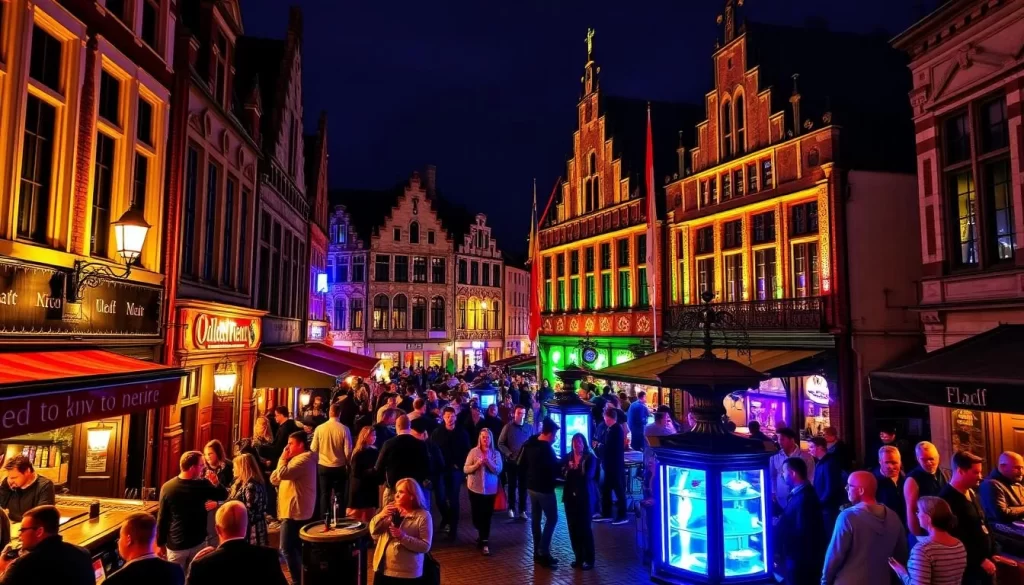
Experience the energetic atmosphere of Leuven’s Oude Markt, a square lined with bars, cafés, and restaurants. Often referred to as “Europe’s longest bar,” this historic square is the heart of Leuven’s social life, offering a unique blend of traditional Belgian culture and modern nightlife.
Best Bars and Cafés to Visit
Oude Markt is home to dozens of bars and cafés, each with its own unique ambiance. You can enjoy a wide range of Belgian beers, from well-known brands like Stella Artois, brewed locally in Leuven, to rare Trappist ales and experimental craft brews developed at the university’s bioscience faculty. For a memorable bar experience, visit Metafoor, a cozy Belgian-style bar known for its selection of local beers and warm atmosphere.
The square offers an impressive array of food options to complement your drinks. Traditional Belgian dishes such as stoofvlees (beef stew) and moules-frites (mussels with fries) are popular choices that pair perfectly with the local brews. Whether you’re looking for a hearty meal or a quick snack, you’ll find something to satisfy your appetite.
Nightlife and Student Culture
Oude Markt is particularly vibrant during the academic year when the university’s 55,000 students bring a distinctive energy to the nightlife scene. Thursday nights are traditionally the busiest, with students and locals gathering to enjoy the lively atmosphere. To make the most of your visit, consider reserving a table at one of the terraces, especially on Thursday or weekend evenings when the square is at its most lively.
The historic significance of Oude Markt adds another layer to its appeal. With a history dating back to 1150, the square has evolved from a traditional market into Leuven’s premier nightlife destination. Despite being heavily damaged during the war, it has been rebuilt with a style that many European cities admire.
Groot Begijnhof: A UNESCO World Heritage Site
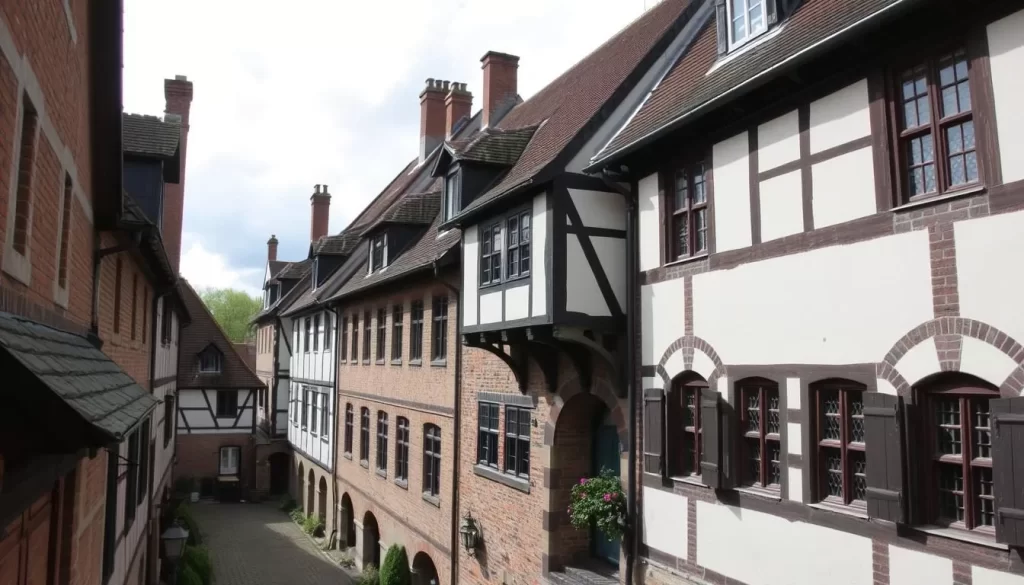
Tucked away in the heart of Leuven, the Groot Begijnhof is a serene oasis that beckons visitors to step back in time. This remarkable site, recognized as a UNESCO World Heritage Site, is a testament to the rich history and architectural heritage of the region.
The History of the Beguines
The Groot Begijnhof was established in the 13th century as a community for the Beguines, lay religious women who sought a spiritual life without taking formal monastic vows. This movement represented one of the earliest forms of female emancipation in Europe, with women living independently and supporting themselves through various crafts and services.
At its peak in the 16th century, the Groot Begijnhof housed around 360 Beguines, who maintained a unique balance between their spiritual pursuits and daily life. The community’s history is a fascinating aspect of Leuven’s cultural heritage, reflecting the independent spirit of its inhabitants.
Architecture and Peaceful Atmosphere
The Groot Begijnhof is renowned for its well-preserved medieval architecture, featuring dozens of sandstone houses, cobblestone streets, and picturesque courtyards. The site’s tranquil atmosphere is enhanced by the absence of commercial establishments, preserving its authentic character.
Today, the Groot Begijnhof continues to serve as a living community, with the historic buildings housing university students and academics. This blend of medieval architecture and contemporary academic life creates a unique and captivating environment, making the Groot Begijnhof a must-visit place in Leuven.
Visitors can stroll through the cobblestone lanes, admire the century-old buildings, and experience the peaceful ambiance that pervades this extraordinary site. The Groot Begijnhof is not just a historical relic but a vibrant part of Leuven’s university life, where people continue to live, study, and thrive.
Klein Begijnhof: The Lesser-Known Beguinage
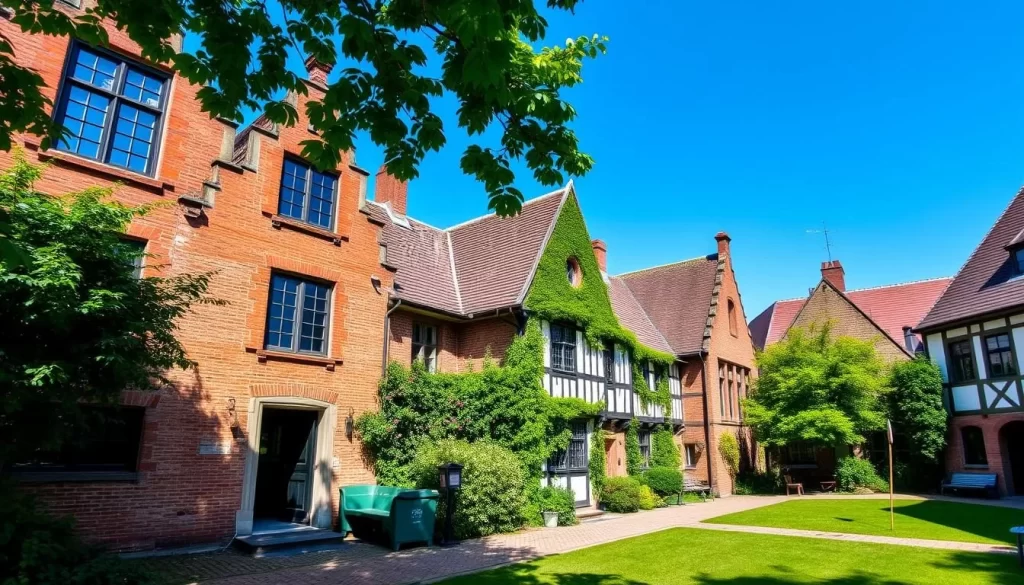
Tucked away in Leuven, the Klein Begijnhof is a hidden gem waiting to be discovered. This lesser-known beguinage offers a unique glimpse into the city’s history and architecture, away from the crowds that often gather at more popular sites.
What Sets Klein Begijnhof Apart
The Klein Begijnhof differs significantly from its more famous counterpart, the Groot Begijnhof. While the Groot Begijnhof is expansive and receives UNESCO recognition, the Klein Begijnhof is more intimate, consisting of a single scenic lane of historic buildings. This concentrated layout creates a unique architectural experience that is particularly appealing to photography enthusiasts and those seeking a tranquil atmosphere.
Another key difference lies in its current use. The buildings of the Klein Begijnhof now primarily serve as student housing for KU Leuven, continuing the tradition of providing homes for independent individuals, albeit for academic rather than religious purposes.
Discovering This Hidden Gem
Finding the Klein Begijnhof requires some local knowledge. The best approach is to start from Keizersberg Abbey, heading through the gatehouse and down the hill until you reach the distinctive historic lane. This walking route not only leads you to the Klein Begijnhof but also offers a chance to explore the abbey, showcasing multiple facets of Leuven’s religious and architectural heritage.
Combining a visit to the Klein Begijnhof with a walk to Keizersberg Abbey creates a perfect day out, highlighting the city’s lesser-known historical spots and providing a moment of tranquility amidst a busy day of sightseeing in Leuven.
Leuven, Belgium: Best Things to Do for Beer Lovers
With its deep-rooted brewing history and innovative beer culture, Leuven is a top destination for beer aficionados. The city offers a unique blend of traditional brewing techniques and modern innovations, making it a paradise for beer enthusiasts.
Stella Artois Brewery Tour
The Stella Artois Brewery tour is a must-do activity in Leuven, offering an immersive experience into one of the world’s oldest and most renowned breweries, dating back to 1366. Visitors can witness the entire production process, from ingredients to bottling, and gain insight into the history and brewing methods of Stella Artois.
During the brewery tour, which costs €14 and should be booked in advance, knowledgeable guides explain Stella’s brewing methods, the brand’s history, and its evolution from local Leuven beer to a global phenomenon. The tour concludes with a refreshing tasting session, allowing you to sample the crisp lager straight from the source.
To visit, you should book a tour in advance. Tours typically happen on Saturdays and Sundays in the afternoon, with some Tuesday options available. Checking the official Stella Artois Tour website will help you choose a time that works for you.
Traditional Belgian Beer Bars
Beyond Stella Artois, Leuven boasts an impressive selection of traditional Belgian beer bars where you can sample hundreds of different Belgian brews, from Trappist ales to lambics and innovative craft creations. You can pair your drinks with traditional Belgian food like carbonade flamande or stoofvlees, dishes that incorporate beer in their preparation and complement the flavors of your drink.
We highly recommend visiting Metafoor, a warm traditional brown café with character and an excellent beer menu, or Fiere Magriet, which offers an even more extensive selection of Belgian beers in an atmospheric setting. For the full Leuven beer experience, be sure to explore these and other local bars.
The Faculty of Bioscience Engineering at KU Leuven actively researches brewing techniques, making the city a center for beer innovation where traditional methods meet scientific approaches to create new flavors and more sustainable production methods. Beer enthusiasts should time their visit to coincide with one of Leuven’s beer festivals or events, such as the Leuven Innovation Beer Festival or special brewery open days.
M Museum Leuven: Art Through the Ages

As you step into the M Museum Leuven, you’re about to embark on an artistic adventure like no other. This museum is a must-visit destination for anyone traveling to Leuven, Belgium. With its broad spectrum of art ranging from the Middle Ages to the present, the M Museum offers a unique blend of historical and contemporary art.
The M Museum Leuven is open Tuesday through Sunday, from 11:00 AM to 6:00 PM, with extended hours on Thursdays until 10:00 PM. This flexibility allows you to plan your visit according to your schedule, whether you’re looking for a daytime cultural escape or an evening of art appreciation.
Highlights of the Collection
The M Museum boasts an impressive collection that includes works by Flemish Primitive painters, such as Dieric Bouts, who is also known for his masterpiece, “The Last Supper,” housed in St. Peter’s Church. The museum’s collection provides a comprehensive journey through the evolution of art, making it a fascinating place to explore.
One of the highlights of the museum is its innovative approach to exhibitions, creating dialogues between different time periods and artistic movements. This approach makes art history accessible and relevant to visitors, regardless of their prior knowledge. The museum’s collection is a testament to Leuven’s rich cultural heritage.
Contemporary Exhibitions and Events
Beyond its permanent collection, the M Museum hosts rotating temporary exhibitions featuring international contemporary artists, designers, and photographers. These exhibitions ensure that each visit to the museum offers something new to discover, keeping the experience fresh and engaging.
The museum’s building itself is a work of art, with its renovated historical sections connected by a striking modern glass structure. This architectural marvel provides a unique backdrop for the diverse collections on display. For the best experience, consider joining one of the guided tours offered by the museum, which provide deeper insights into key works and the curatorial vision behind the exhibitions.
To make the most of your visit, you can purchase your ticket in advance or consider the ILUVLeuven combined ticket if you plan to visit multiple attractions. This offers better value and a more streamlined experience, allowing you to enjoy the museum and the city of Leuven without any hassle.
Natural Escapes in and Around Leuven
Beyond Leuven’s historic city center, you’ll discover a wealth of natural escapes that are perfect for relaxation. The city offers a unique blend of cultural attractions and serene natural environments, making it an ideal destination for those seeking a balanced experience.
Leuven’s Botanical Garden
The Leuven Botanical Garden, established in 1738, is the oldest of its kind in Belgium. This beautiful place is not only a tranquil escape from the university city’s hustle and bustle but also a center of scientific research and conservation for the Katholieke Universiteit Leuven. As you stroll through the garden, you’ll find an array of plant species ranging from medicinal herbs to exotic tropical species housed in the historic orangery and throughout the grounds.
The garden’s unique layout and collection make it an educational experience as well, with informative labels that help you understand the plants’ origins and uses. One of the garden’s highlights is the greenhouse complex, where you can explore different climates from around the world and see plants you might not find elsewhere in Belgium.
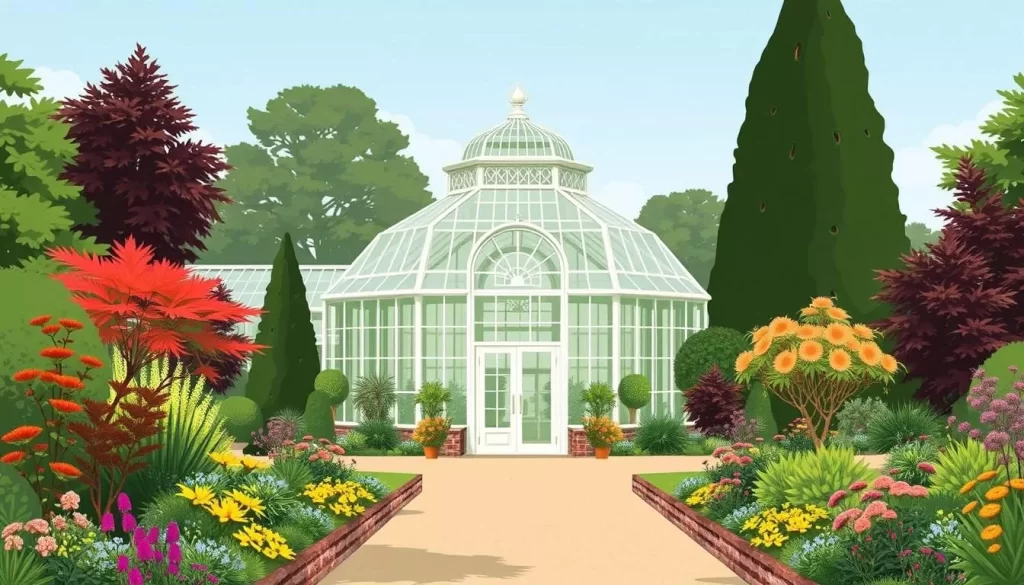
Cycling Routes in the Belgian Countryside
Though Leuven itself isn’t particularly pastoral, it’s surrounded by stunning countryside that’s perfect for cycling excursions. The rolling hills, forests, and picturesque villages are connected by an extensive network of well-marked cycling paths, making it easy to plan your trip. You can use apps like Wandelknooppunt and Vlaanderen Fietsland to navigate the paths and discover hidden spots that can’t be reached by public transportation.
For those without their own bicycles, Leuven offers convenient bike rental options, making it easy for visitors to explore the surrounding countryside and enjoy a leisurely walking or cycling tour. The Doode Beemde forest area makes for an excellent cycling day trip from Leuven, offering scenic natural landscapes and wildlife viewing opportunities just a short ride from the city.
In conclusion, Leuven offers a mix of natural escapes that provide a refreshing counterpoint to the city’s architectural and cultural attractions. Whether you’re exploring the Leuven Botanical Garden or cycling through the Belgian countryside, you’ll find that these natural environments enhance your overall experience of the city and its surroundings.
Abbey Explorations: Historical and Spiritual Sites
Beyond the bustling city center of Leuven lies a tranquil world of abbeys, each with its own unique history and architectural splendor. You can explore these serene sites to experience the rich spiritual heritage of the region.
Park Abbey and PARCUM Museum
Park Abbey, a serene oasis on the outskirts of Leuven, is home to the PARCUM Museum of Religious Art. As you visit the museum, you’ll discover an impressive collection of religious artifacts, artworks, and manuscripts that span centuries. The museum is open from Tuesday to Sunday, offering a unique blend of tranquility and cultural enrichment.
The PARCUM Museum showcases stunning examples of sacred art, including medieval sculptures and rare manuscripts that highlight the spiritual and artistic heritage of the region. The atmosphere is contemplative, designed to encourage reflection on the intersection of faith, art, and history. You can also stroll through the beautiful grounds, making it a wonderful place for a picnic or a leisurely walk.
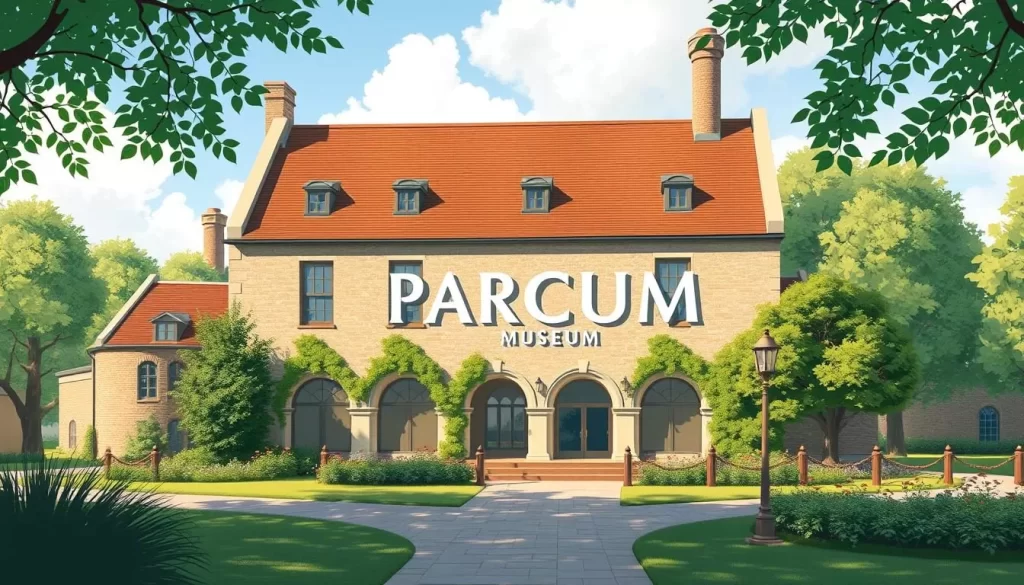
Keizersberg Abbey and Its Views
For a panoramic view of Leuven, head to Keizersberg Abbey, perched on a hill overlooking the city. While the abbey itself can only be visited by appointment, the surrounding park is freely accessible and offers multiple vantage points to admire Leuven’s skyline. Many consider the view from Keizersberg Abbey to be superior even to that from the famous library tower, making it a perfect spot for photography enthusiasts.
As you explore the area around these abbeys, you’ll journey through less-touristed parts of Leuven, gaining a more authentic experience of how the city transitions from urban center to peaceful countryside. For a deeper understanding, you can arrange a guided tour through the tourism office, focusing on the religious heritage of these sites.
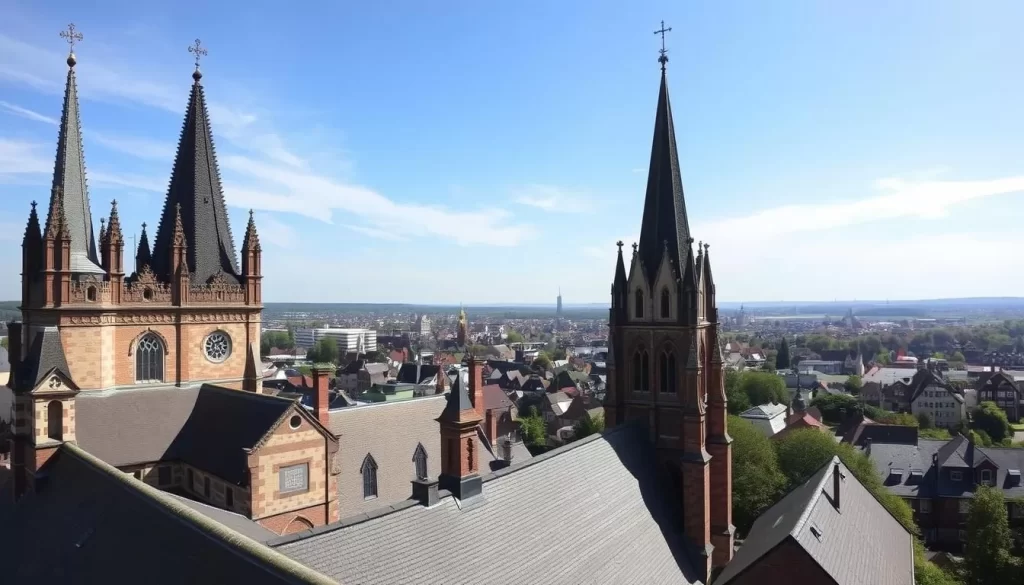
Leuven’s War History and Memorials

As you explore Leuven, you’ll uncover the city’s complex history, including its experiences during wartime. Leuven bears deep scars from both World Wars, with the city experiencing particularly devastating destruction during the German invasion of 1914 that forever changed its physical landscape and cultural heritage.
The Story of Léon Schreurs
The poignant story of Léon Schreurs, known as “the last defender of Leuven,” exemplifies individual courage in the face of overwhelming odds. Léon, after missing his platoon’s departure due to oversleeping at a bar, single-handedly confronted the invading German army. Armed with only one rifle and positioned behind a post box, Léon managed to kill five German soldiers before being shot himself, becoming a symbol of resistance and defiance that continues to resonate in local memory.
Léon Schreurs’ bravery is a testament to the human spirit during times of war. His story is a reminder of the sacrifices made by individuals to defend their city and its people.
Leuven Cemetery and War Memorials
Visitors can pay respects to Léon Schreurs at Leuven Cemetery, where his grave lies alongside other war casualties in a long, deep catacomb that’s easily missed but worth seeking out for those interested in the human stories behind historical events. The cemetery also contains thoughtful memorials to victims of both World Wars, offering a quiet place for reflection on the tremendous toll these conflicts took on this university town.
The University Library, a significant building in Leuven’s history, was deliberately burned by German troops in 1914, destroying 230,000 books and 750 medieval manuscripts. This event marked a dark period in the city’s history, highlighting the impact of war on cultural heritage.
Over the years, Leuven has rebuilt itself while preserving the memory of these traumatic historical events. The war memorials and sites throughout the city tell an important part of Leuven’s story, serving as a reminder of the resilience of its people.
Culinary Experiences in Leuven
Leuven’s culinary landscape is a vibrant reflection of its academic vibe, offering a diverse range of dining experiences. The presence of KU Leuven, one of Europe’s top universities, has significantly influenced the city’s food culture, bringing together a mix of traditional Belgian cuisine and international flavors. As you explore Leuven, you’ll discover a plethora of options to satisfy your culinary cravings, from hearty traditional dishes to innovative fusion concepts.
Traditional Belgian Cuisine
Traditional Belgian food in Leuven is a treat for the taste buds. You can indulge in hearty dishes such as waterzooi, a creamy stew made with chicken or fish, and stoofvlees, a rich beef stew cooked in beer. Of course, no visit to Leuven is complete without trying the perfectly crispy frites served with a variety of specialty mayonnaises. For an authentic Belgian culinary experience, reserve a table at a traditional brasserie where you can sample local beers alongside classic dishes.
The city’s culinary scene also caters to vegetarian and vegan diets, with many restaurants offering plant-based versions of traditional Belgian dishes. This blend of traditional and modern cuisine makes Leuven an exciting place to explore for food enthusiasts.
Trendy Cafés and Restaurants
Leuven is not just about traditional cuisine; it’s also a hub for trendy cafés and restaurants that offer innovative dining experiences. For a unique dining experience, Barraca (Tiensestraat 34) is highly recommended for its Italian-inspired tapas with a twist. Their dragon balls with prawns are a must-try, and the décor offers a cool NYC Lower East Side vibe.
For beer enthusiasts, Hop Gastrobar (Vaartkom 1a) is a mesmerizing spot where chefs prepare tasting menus at the kitchen bar, paired with Belgian beers that complement the flavors. If you’re looking for a great lunch option, Bar Leuv (Parijsstraat 6) offers innovative takes on classic Belgian sandwiches.
To further enhance your culinary experience in Leuven, consider visiting Mok Roastery & Specialty Bar (Diestsestraat 165) for expertly crafted coffee. Their flat whites are nutty and subtle with slight citrus notes, and the milk is textured to perfection.
Here’s a summary of Leuven’s culinary highlights in a table format:
| Restaurant/Café | Cuisine/Type | Highlights |
|---|---|---|
| Barraca | Italian-inspired tapas | Dragon balls with prawns, unique décor |
| Hop Gastrobar | Gastrobar experience | Tasting menus paired with Belgian beers |
| Bar Leuv | Belgian sandwiches | Innovative takes on classic sandwiches |
| Mok Roastery & Specialty Bar | Specialty coffee | Expertly crafted flat whites, on-site roasted beans |
Leuven’s culinary scene is a reflection of its vibrant academic and cultural atmosphere, offering something for every palate. Whether you’re in the mood for traditional Belgian cuisine or innovative fusion dishes, Leuven is sure to delight your senses. As you plan your visit, be sure to include some of these culinary highlights in your itinerary to experience the best of what Leuven has to offer.
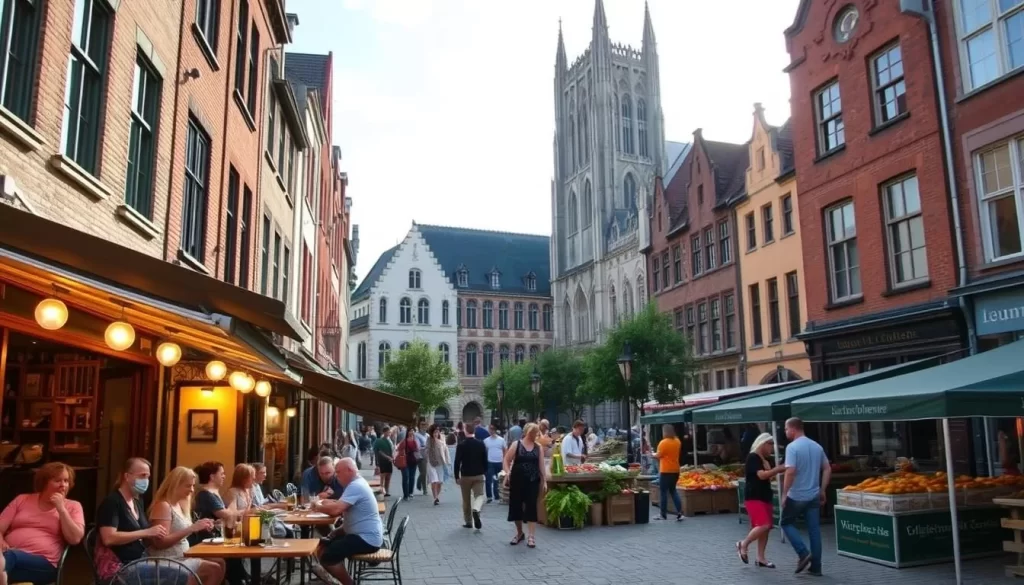
Day Trips from Leuven
Day trips from Leuven offer a chance to experience the best of Belgian history, nature, and culture. With its strategic location in Flemish Brabant, Leuven serves as an excellent base for exploring the surrounding region.
Tervuren Park and Africa Museum
Tervuren Park, located to the west of Leuven, is a must-visit destination for nature lovers and those interested in history. The park is home to the Africa Museum, formerly known as the Royal Museum for Central Africa, which is situated in an old palace at the center of the park.
The Africa Museum presents a complex examination of Belgium’s colonial history in Central Africa. After years of renovation, it reopened in 2019, attempting to acknowledge the atrocities committed during Belgium’s colonial rule. The museum is housed in a palace commissioned by King Leopold II, who was infamous for his role in the human zoo of Congolese people at the 1897 World Fair.
Despite the museum’s problematic past, Tervuren Park remains a worthwhile visit. The park offers extensive walking and cycling paths through lush forests, providing a natural escape from the urban environment of Leuven.
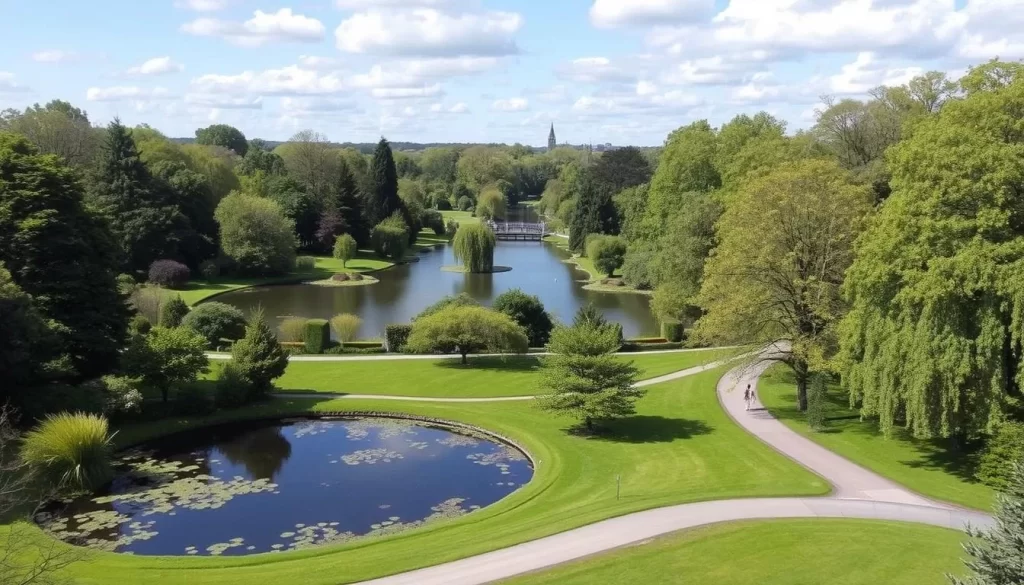
Horst Castle
If you’re willing to take a 25-kilometer round trip from Leuven, Horst Castle in Holsbeek is a picturesque destination that should not be missed. The medieval castle appears to float on water, connected to land by a stone bridge. Visitors can explore the castle interior between 10:00 and 17:00, or simply enjoy the walking trails and fishing spots in the surrounding grounds.
For photography enthusiasts, visiting Horst Castle during sunrise or sunset is highly recommended. The golden light illuminates the castle, and on calm days, the reflection creates a perfect mirror image in the surrounding waters.
Image of Horst Castle
In addition to Tervuren Park and Horst Castle, there are numerous other day trip options from Leuven. Visitors can explore Park Abbey with its PARCUM Museum, the historic center of the university town Mechelen, or enjoy cycling routes through the Belgian countryside, showcasing the region’s agricultural heritage.
These day trips can be easily arranged using public transportation or by renting a bicycle, with most destinations accessible within 30-60 minutes of travel time.
Conclusion: Making the Most of Your Visit to Leuven
Leuven, a hidden gem in Belgium, offers a unique blend of historical significance and youthful energy. As you explore this medieval city, you’ll discover that its compact size makes it perfect for walking tours, allowing you to uncover its many hidden gems.
To make the most of your visit, consider purchasing the ILUVLeuven combined ticket, which grants you access to several key attractions, including a 45-minute walking tour, the University Library and Tower, and either the M Museum or Park Abbey. This ticket is a great way to save money on entrance fees while experiencing the best of Leuven.
One of the highlights of Leuven is its vibrant food and beer culture. Be sure to sample some of the extensive selection of Belgian beers at traditional bars like Metafoor, and enjoy meals at both traditional and innovative restaurants that showcase the city’s culinary creativity. From hearty Belgian cuisine to modern twists on classic dishes, Leuven’s dining scene has something for every palate.
In addition to its well-known attractions, Leuven also has a number of lesser-known spots that are worth exploring. The Klein Begijnhof and Keizersberg Abbey are two such places that offer a glimpse into the city’s rich history and provide a peaceful escape from the crowds. Timing your visit to coincide with one of Leuven’s many festivals or university events can also add to your experience, as the city’s streets come alive with students and visitors celebrating everything from beer to music to academic achievements.
Leuven’s central location within Belgium and its excellent train connections make it an ideal home base for exploring other Belgian cities. With Brussels just 20 minutes away and Antwerp, Ghent, and Bruges all accessible for day trips, you can easily explore the wider region. We highly recommend setting aside at least one full day for Leuven, though history enthusiasts, beer lovers, and architecture aficionados could easily spend two or three days exploring the city’s many facets.
As you depart Leuven, you’ll take with you not just memories of grand Gothic architecture and world-class museums, but also the special atmosphere created by centuries of history existing alongside the vibrant energy of thousands of students—a combination that makes Leuven truly unique. Whether you’re looking for a relaxing getaway or an action-packed adventure, Leuven is a destination that is sure to leave a lasting impression.
